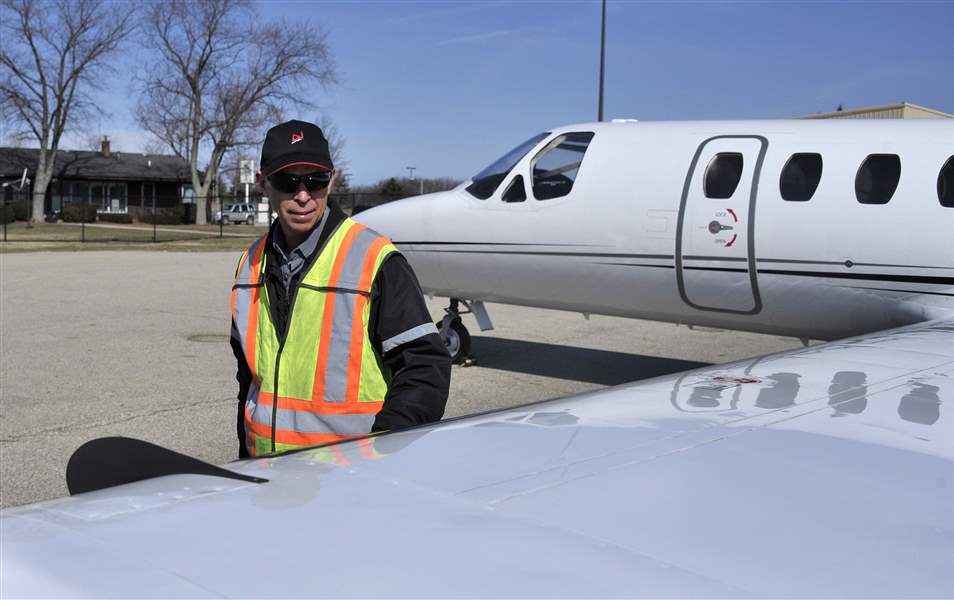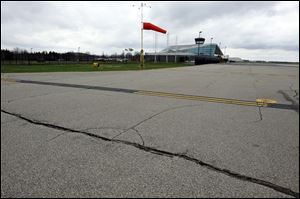
Michigan considers aviation fuel tax increase
5/1/2014
Mick Osborne, of Tulip City Air services, looks over a Citation that is due to fly in a couple of hours at the West Michigan Regional Airport in Holland, Mich., on April 9, 2014. The airport offices are due for replacement. Michigan airport executives are asking for the first aviation fuel tax increase in 85 years to make improvements and repairs at the state's 235 public airports. (AP Photo/The Detroit News, Dale G. Young)
ASSOCIATED PRESS

Cracks mar the runway at Oakland County International Airport in Waterford, Mich. show what repairs are needed that would be funded by the increased aviation fuel tax.
DETROIT — Michigan airport executives want an aviation fuel tax increase to help make improvements and repairs at the state’s 235 public airports, officials said.
A plan approved by the state House would help general aviation and commercial airports avoid falling far short of more than $730 million needed for fixes in the next five years. It’s stuck in the Senate, The Detroit News reported, in part amid concerns by Delta Air Lines.
About $190 million in runway and taxiway reconstruction, as well as demolition work at the Smith and Berry terminals at Detroit Metropolitan Airport, is at stake as part of the state’s five-year plan. Other major projects are planned in Grand Rapids, Flint and elsewhere.
Some upgrades and fixes could be delayed or scrapped because the 3-cent-per-gallon aviation fuel tax isn’t generating enough revenue.
Delta Air Lines spokesman Trebor Banstetter said Michigan’s overall fuel tax costs are the highest among the Atlanta-based airline’s hubs, which include Detroit Metropolitan Airport in Romulus. The airline is Michigan’s biggest passenger air carrier.
“Michigan has one of the least competitive fuel tax structures in the nation,” Banstetter said. “That’s why we’re working with legislative leaders to find a solution that both addresses the competition problem and creates a permanent, stable funding source for Michigan’s airports.”
The state increasingly is challenged not only to pay for airport amenities that assist travelers, but also to cover the costs of safety-related maintenance such as runway signaling and crack sealing, said Kevin Klein, president of the Michigan Association of Airport Executives.
“It’s a question of having enough money to meet our infrastructure needs,” said Klein, who runs Traverse City’s Cherry Capital Airport, where $8 million in improvements are proposed through 2019.
Michigan has received about $90 million a year in federal funds for airport maintenance and capital improvements with a $10 million state-local government match, Klein said. Revenues from the aviation tax, which was initially adopted in 1929, were just under $8 million in 2004, subsequently dropped below $6 million and now threaten to fall below $5 million, Klein said.
Improvement projects in the works are scattered around the state. They include $70 million in improvements at Willow Run airport in the Ypsilanti area, $60 million at Gerald R. Ford International Airport in Grand Rapids and $29 million at Bishop International Airport in Flint.